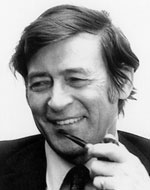Three Annual Scott Greer Awards
The Scott Greer Award for Postgraduate Contribution to Urban Affairs is awarded to an alumnus for distinguished civic leadership and community practice.
The Scott Greer Award for Postgraduate Achievement in the Study of Urban Social Institutions is awarded to an alumnus whose postgraduate publication, teaching or professional activities have advanced our understanding of urban social institutions, their history, interrelationship, consequences, and change.
The Scott Greer Award for Outstanding Research in Urban Studies recognizes the recent and ongoing superior research of a current student.
Scott Greer’s Career
 Scott Greer was Distinguished Professor of Sociology and Urban Studies at UWM from 1974 until his death in 1996. He was the first director of the doctoral program in Urban Social Institutions at its founding in 1975. Greer was an internationally renowned urban scholar, and a published poet, as well. Some of his best known titles are The Emerging City: Myth and Reality; Governing the Metropolis; Urban Renewal and American Cities; The Concept of Community and The Urbane View. Cities of the Soul, published posthumously, is a collection of poetry, letters and essays.
Scott Greer was Distinguished Professor of Sociology and Urban Studies at UWM from 1974 until his death in 1996. He was the first director of the doctoral program in Urban Social Institutions at its founding in 1975. Greer was an internationally renowned urban scholar, and a published poet, as well. Some of his best known titles are The Emerging City: Myth and Reality; Governing the Metropolis; Urban Renewal and American Cities; The Concept of Community and The Urbane View. Cities of the Soul, published posthumously, is a collection of poetry, letters and essays.
- In a letter nominating Scott Greer for inclusion on the Spaights Plaza marker, March 23, 1998, Distinguished Professor Harold Rose wrote:
“Scott Greer was one of the most distinguished and productive scholars in Sociology and Urban Studies to appear on the American scene in the last half of the 20th century.” - USP Director Dale Jaffe, Memorial USP Newsletter, Spring 1996:
“Scott Greer, an individual whose name is synonymous with urban studies in the United States and whose personal history parallels the field’s maturation… Few can ever hope to achieve the breadth of knowledge and talent that Scott Greer demonstrated during his life time. In addition to authoring or co-authoring 24 books and over 60 articles, book chapters and essays, Scott was a published poet.” - William Mayrl nominating Scott Greer for Distinguished Professorship, November 16, 1981:
“To have [had] one of the country’s most well known and respected urban sociologists on our faculty gives meaning and, indeed credibility to our urban mission.” - Chancellor Nancy l. Zimpher October 9, 1998:
“The Ernest Spaights Plaza marker honors ‘individuals who have made significant, enduring and campus-wise contributions to the growth and development of the University of Wisconsin-Milwaukee.’ Among those honored is Distinguished Professor Scott Greer.”
His Students
- UWM Post, Requiem for a Thinker, January 29, 1996:
“Greer’s ideas played such a role in shaping urban sociology that many of his statements today seem like truisms. Most notably he …developed theories of globalization, which he referred to as ‘increasing societal scale.’ He meant the increasing ability of society to subdivide, its loss of common institutions and bonds of trust, and its rapidly increasing complexity … His writings of the late 1950s and 1960s foreshadow most of the concerns with global society that occupy academics and journalists today.” - Senior Research Scientist Lois Quinn nominating Scott Greer for inclusion on the Spaights Plaza marker, March 23, 1998 — former student:
“Much of the preeminence of the University of Wisconsin-Milwaukee has come from its focus on urban issues critical to Milwaukee and other U.S. cities. We are grateful to Scott Greer for his commitment to the University’s urban mission, his years of service in building the Urban Studies program and the Urban Research Center, and his lasting influence as a teacher.” - Milwaukee County Board of Supervisors Vice Chair Daniel Diliberti nominating Scott Greer for inclusion on the Spaights Plaza marker, March 12, 1998 — former student:
“Scott Greer’s impact shaped… the careers of many people with whom I have frequent contact in my work in this metropolitan areas. We share a common experience of rigorous academic training and critical thinking skills that have proven invaluable to success in a constantly changing world.”
His Values
- Distinguished Professor Joan Moore at UWM’s Tribute to Scott Greer, April 25, 1996:
“Scott wanted researchers to view urbanism as a process that was characterized by an increase in societal scale, which, in turn, left a deep imprint on the character of social institutions and culture … His scholarship can be measured not only in terms of his contribution to new knowledge, but also in terms of a set of provocative questions …[that] continue to supply some critical points of departure for a younger generation of scholars.” - Professor Wendell Bell, Yale University, obituary in the newsletter of the American Sociological Association, May 1996:
“Although getting the facts straight was an important aspect of all his sociological work, Scott Greer typically aimed to make the world — especially the urban world — a better place to live, where ordinary people could exist in peace and have an equal and fair chance of achieving fulfilling lives. For him, sociology not only was the pursuit of knowledge, but was a road to empowerment, so people could live meaningful lives of their own choosing.” - Professor Meredith Watts in a letter nominating Scott Greer for inclusion on the Spaights Plaza marker, March 14, 1998:
“Though he was clearly a rare and gifted intellectual force, he was the most democratic of scholars in his support for good ideas wherever he found them.”